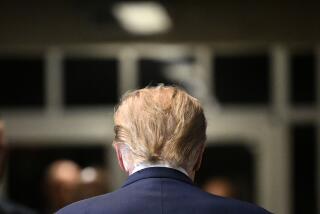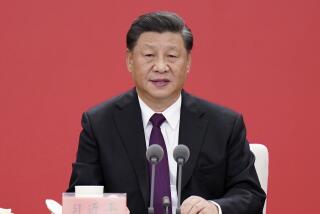John Yoo and Jay Bybee’s disgrace
Arespected career Justice Department official has concluded that two George W. Bush administration lawyers who wrote memos authorizing the physical and psychological abuse of suspected terrorists didn’t commit misconduct that would justify disbarring or disciplining them. But Associate Deputy Atty. Gen. David Margolis’ report is far from a vindication for John C. Yoo and Jay S. Bybee’s shamefully narrow interpretations of laws against torture and extravagant views about presidential power.
At issue are three documents, including an Aug. 1, 2002, memorandum from Bybee to White House Counsel Alberto R. Gonzales that, understandably, has become known as the “torture memo.” Drafted by Yoo, it defined the “severe” pain prohibited by an anti-torture law as that associated with “death, organ failure or serious impairment of body functions” -- meaning anything short of that was permissible.
That language was a paraphrase of a legal provision defining a medical emergency -- a context far removed from torture. But there was more: Even if waterboarding and other “enhanced interrogation” techniques were considered torture, the memo suggested, interrogators would be violating the law only if inflicting pain was their “precise objective.” And even then, they might claim self-defense. For good measure, the memo suggested that the law’s ban on torture might be unconstitutional if it interfered with the president’s powers as commander in chief.
Investigators for the Justice Department’s Office of Professional Responsibility concluded last year that Yoo, a professor at UC Berkeley, “knowingly failed to provide a thorough, objective and candid interpretation of the law” and that Bybee, now a federal judge, “acted in reckless disregard of his professional obligations.” They recommended that the Justice Department refer their findings to state bar associations for possible discipline. That won’t happen now that Margolis has concluded that, although Yoo and Bybee committed significant errors, their opinions didn’t amount to misconduct.
Margolis’ report is cautious and restrained -- the opposite of the sort of freewheeling lawyering engaged in by Yoo and Bybee -- and focuses to a great extent on flaws in the investigators’ arguments. Like the American legal system in general, it resolves doubts in favor of the accused.
Still, we worry that his measured verdict will be misrepresented as an exoneration of two lawyers who, whether or not they committed intentional misconduct, allowed themselves to serve as accessories to a policy that has caused incalculable damage to this country’s moral authority. They may not be disbarred, but they are disgraced.
More to Read
Get the L.A. Times Politics newsletter
Deeply reported insights into legislation, politics and policy from Sacramento, Washington and beyond. In your inbox three times per week.
You may occasionally receive promotional content from the Los Angeles Times.






